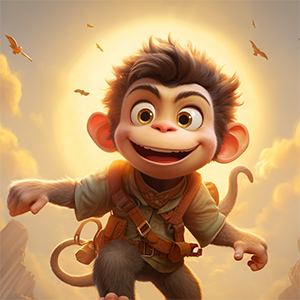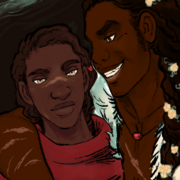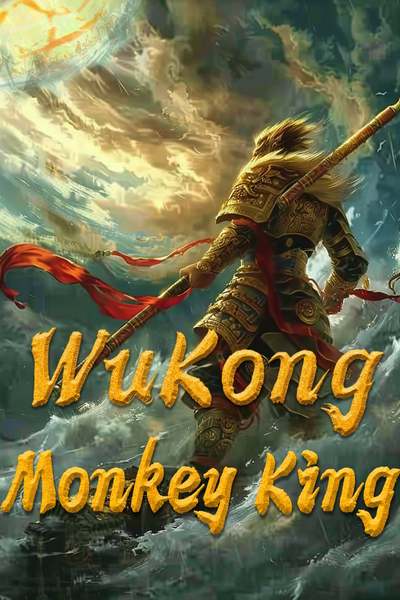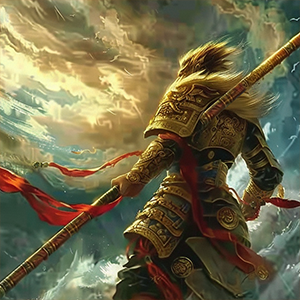The stone monkey approached with a sense of delight akin to spotting a movie blooper, bowing and saying, "Old immortal, your disciple bows to you."
The woodcutter, calm and unhurried, dropped his axe and leisurely descended from the withered tree, turning to return the gesture, "You've mistaken, mistaken. How could I dare accept the title of 'immortal'?"
"How can you speak the words of immortals if you're not one?" the stone monkey recited his lines meticulously, thinking to himself not to improvise at the last moment, or he would be at a loss for actions.
The woodcutter chuckled, "What immortal words?"
The stone monkey replied, "The song you sang is extraordinary, not of a mortal's insight."
Laughing, the woodcutter confessed, "Honestly, the song was taught by an immortal. I'm merely capable of singing a few lines."
The stone monkey said, "Since it's taught by an immortal, you must know where this immortal resides. Could you tell me so I can visit? It would bring you great fortune out of thin air."
The woodcutter subtly revealed a smile and happily said, "That mountain is called the Mountain of Spirits and Inches. In the mountain, there is a cave named the Cave of the Slanting Moon and Three Stars. The master inside is called Patriarch Subhuti. If you follow the stream upwards and head south for seven or eight miles, you will find his abode."
The stone monkey was delighted inside, finding it just like the descriptions in the books. He said, "Elder brother, why don't you come with me? If I gain any benefit, I will certainly not forget the kindness of your guidance."
The woodcutter hurriedly waved his hands in refusal, saying, "You really don't understand the situation. If I go with you, wouldn't that ruin my business? I need to chop wood. You go on your own, go on your own."
However, the stone monkey was already convinced that this woodcutter was an immortal in disguise and started to play along, "How could chopping wood be better than being an immortal? Let's go together. From now on, we will be fellow disciples. What a great fate that would be."
The woodcutter gave a bitter smile, repeatedly declining, "Everyone has their own aspirations. It's not right to force others."
The stone monkey, suppressing his laughter, bowed and said, "If that's the case, then I will go alone."
At this moment, it was noon. The stone monkey bid farewell to the woodcutter and followed the stream towards the sun. Despite being in between tall mountains and ridges, he was actually in a valley. After walking for a while, he was amazed to find that he had reached the foot of the mountains without realizing it. Upon reaching the peak, he indeed saw a cave dwelling. On a vast platform, ancient pines and cypresses stood tall and strong, their branches and leaves like flying dragons. A stone bridge spanned a deep chasm, with exotic flowers adorning its sides, and in the forest, mysterious monkeys and white deer hid deep within.
Crossing the bridge, the stone monkey saw a stone tablet at the cliff's edge, three meters high and eight feet wide, with ten large characters inscribed on it: "Mountain of Spirits and Inches, Cave of the Slanting Moon and Three Stars."
Seeing the cave door closed, the stone monkey knocked. Soon, the door opened, and a celestial child came out, shouting, "Who disturbs this place?" The stone monkey replied, "Celestial child, I have come to seek the way of the immortals and mean no disturbance." The celestial child laughed, "My master said someone seeking the Dao would come. It must be you, right?" The stone monkey said, "Indeed, it is me." At this moment, his heart was filled with excitement. After searching for over a year and enduring many hardships, he had finally arrived. Thinking of the divine powers he was about to learn, his heart raced with anticipation.
Calmly, the stone monkey entered the cave. The celestial child took out a set of clothes from the gatehouse, which fit the stone monkey as if tailor-made. After adjusting his clothes, he walked through layers of splendid halls and exquisite palaces, until he arrived beneath the Jade Terrace.
Looking up, the stone monkey was startled. The person sitting above seemed familiar!
The person seated on the high platform wore a tall, majestic crown, his long beard fluttering. His eyes shone like bright stars, his hair white as a crane's, his face youthful. He was dressed in a light yellow Taoist robe, wearing golden silk shoes, and leaning on a white whisk on his left arm. His demeanor was serene yet imbued with an indescribable authority.
The stone monkey knew at once that this was his future master—Patriarch Subhuti. He stepped forward and bowed deeply, "Great Patriarch, I bow with all my heart, I bow with all my heart!"
This line was also from "Journey to the West." The stone monkey used it without feeling any embarrassment.
The Patriarch said, "I know where you come from, and I know where you're going." His eyes were half-closed, but the stone monkey on the ground felt the Patriarch's gaze piercing into him, as if seeing into his very soul.
The stone monkey thought defiantly, doubting the Patriarch could see his true form.
The Patriarch then said, "Seeking the Dao and immortality is ultimately about striving for a place among the immortals. Do you have a name?"
The stone monkey was overjoyed, hurriedly responding, "Nameless, I am nameless."
"You are naturally a macaque, born of heaven and earth. I shall give you the surname Sun(The surname Sun, in Chinese, the word for "macaque" (狲) is a homophone with Sun (孙).)," the Patriarch said. "Our sect has twelve generations, representing vast wisdom, true nature, and complete enlightenment. You belong to the tenth generation. Your Dharma name will be 'Wukong.' How about that?"
The stone monkey leaped up joyfully, "Great, Wukong, Wukong. From now on, I shall be called Sun Wukong. Thank you for granting me this name, great Patriarch!"
The Patriarch smiled slightly, "Wukong, Wukong, after all the understanding, it all returns to emptiness. You will understand the profound meaning in time."
The stone monkey thought, he probably wants me to enter the Buddhist sect, which sees everything as neither substantial nor empty. Dream on!
The Patriarch then said, "Ruyi, take Wukong down and teach him some manners."
A young Daoist boy, about thirteen or fourteen years old, stepped out from the side, bowed to the Patriarch, and led the stone monkey away.
Wukong pondered in secret, 'The word "ru" ranks sixth, and I am tenth. Should I also address the master as such?' Ruyi led Wukong through a corridor, seemingly aware of his thoughts, turned around with a smile and said, "Just call me Brother Ruyi. In our sect, aside from the master, we all address each other as brothers." Wukong agreed repeatedly, and Ruyi settled him into a small chamber equipped with everyday necessities. He also instructed Wukong on daily tasks such as carrying water, sweeping the courtyard, picking fruits, and starting the stove, all of which Wukong accepted.
※ ※ ※
Time swiftly passed, and two months flew by for Wukong in the Cave of the Slanting Moon and Three Stars, his days filled with chopping wood and carrying water, cleaning the courtyard like a menial laborer. Far from glimpsing the path of immortality, he hadn't even touched the basics.
As time stretched on, Wukong couldn't help feeling restless. He knew this was the master testing his patience. Recalling "Journey to the West," Wukong spent seven years enduring hardships before receiving a single mantra, its authenticity still uncertain.
Seven years—thinking of the celestial mountains and seas in the world of "Journey to the West," Wukong longed for them. How would he endure these seven years? Why did the master decide to refine him for seven years? With his immense abilities, respected in both Buddhism and Taoism, spending so much time on Wukong seemed especially suspicious.
Wukong remembered the details of his apprenticeship in "Journey to the West": After six or seven years of menial tasks, he deciphered a profound riddle and received the mantra of eternal life from the master during the third watch of the night. Three years later, he was taught the seventy-two transformations and given the cloud somersault. Incredibly, the book stated:
The master said, "Come forward, and I will pass the mantra to you." He whispered the profound methods into Wukong's ear. The Monkey King, once he grasped one concept, understood them all. He practiced the mantra and perfected the seventy-two transformations.
Evidently, mastering this powerful ability took Wukong only a moment, with the essence lying in the mantra the master imparted. This indicates that, given Wukong's talents and physical condition, the seventy-two transformations required no practice, only understanding the mantra.
Realizing this, Wukong continued his analysis. To master the seventy-two transformations, merely knowing the mantra was insufficient. Otherwise, there would be no need for the master to have given him the mantra of eternal life three years earlier. This suggests that the mantra of eternal life was likely essential for altering one's physique and entering the immortal gates, and at least three years of practice were needed to meet the conditions for learning the seventy-two transformations and the cloud somersault.
Considering this, the previous seven years seemed wasted. From Master Subhuti's attitude towards Wukong, teaching him skills was a certainty. So, what was the purpose of those seven years?
Wukong reviewed "Journey to the West" and recalled the Monkey King's joy and excitement during the master's lecture on the Great Way, which led the master to give him personal instruction. Perhaps, during those seven years, the master was waiting for Wukong's enlightenment. This seemed the only explanation; without sufficient understanding, even if the mantra of eternal life were passed on, it would be useless.
With this realization, the gloom in Wukong's heart cleared significantly. It seemed time to find an opportunity to show his worth.
Annotations:
Patriarch Subhuti(菩提祖师): A figure in Buddhism known for his understanding of emptiness and the nature of perceptions. In Chinese mythology and literature, he's often depicted as a teacher of powerful beings seeking enlightenment.
Cave of the Slanting Moon and Three Stars(三星斜月洞): These fictional locations are rich in symbolism, often representing the pursuit of enlightenment and the challenges one must overcome on the spiritual path.
Dharma name(法号): In Buddhist tradition, a new name given upon initiation into the spiritual life, signifying a new phase of one's spiritual journey.
"Wukong"(悟空): Translates to "Understanding Emptiness," reflecting the character's journey and spiritual quest in the narrative.
The third watch of the night (三更时分): In ancient China, the night was divided into five watches. The third watch refers to the period from approximately 11 p.m. to 1 a.m.
The secret teachings of immortality (长生妙道的口诀): These teachings are central to Taoist practices, emphasizing the cultivation of life force (Qi) to achieve immortality and enlightenment. The teachings encompass meditation, breathing exercises, dietary restrictions, and moral living.
The seventy-two transformations (七十二变): A set of magical abilities that allow Sun Wukong to transform into various animals and objects. It symbolizes the mastery of form and essence.
Cloud somersault (筋斗云): Another of Sun Wukong's magical abilities, allowing him to travel vast distances with a single somersault. It represents the freedom of movement and the transcendence of physical limitations.











Comments (0)
See all